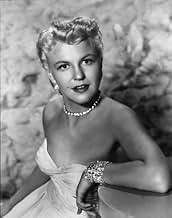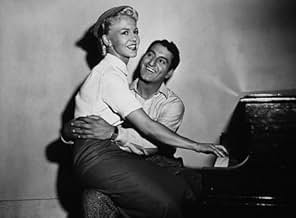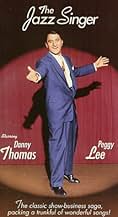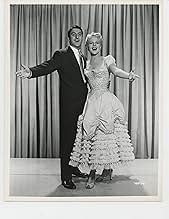VALUTAZIONE IMDb
5,7/10
439
LA TUA VALUTAZIONE
Aggiungi una trama nella tua linguaJerry dreams of becoming a famous jazz singer, but to accomplish that, he must defy his father, a Jewish Cantor who opposes such a dream as a future for a son of his.Jerry dreams of becoming a famous jazz singer, but to accomplish that, he must defy his father, a Jewish Cantor who opposes such a dream as a future for a son of his.Jerry dreams of becoming a famous jazz singer, but to accomplish that, he must defy his father, a Jewish Cantor who opposes such a dream as a future for a son of his.
- Regia
- Sceneggiatura
- Star
- Candidato a 1 Oscar
- 1 candidatura in totale
Murray Alper
- Taxi Driver
- (non citato nei titoli originali)
Jimmy Ames
- Music Store Proprietor
- (non citato nei titoli originali)
Recensioni in evidenza
Good grief.. to think I've seen it all.. Danny Thomas looks SO out of place in this mishmash. He seems really uncomfortable. He can't sing worth a lick, and when he's paired up with Peggy Lee (PEGGY LEE???) she easily.. EASILY outsings him! Maybe the director saw this and made him do the reall really bad comedy routines that he sometimes does in the film. Peggy Lee is okay, but the whole thing is a shambles. Good for a laugh, maybe.
102server
To be frank, this is probably the best version in my book as a sound movie version of the Jazz Singer. The 1927 version is really a silent movie despite its build-up as the first talkie.
Danny Thomas is a great comedian, and he sings very well. He does the Jewish stuff with feeling. Peggy Lee is great and any film that has her is always entertaining. Allan Joslyn is not too entertaining and we could have done without him. One question: since when do Cantors live in such luxurious houses???
Danny Thomas is a great comedian, and he sings very well. He does the Jewish stuff with feeling. Peggy Lee is great and any film that has her is always entertaining. Allan Joslyn is not too entertaining and we could have done without him. One question: since when do Cantors live in such luxurious houses???
By 1952 Hollywood decided to remake the Al Jolson first-talking classic.
This time the Cantor's son was played by Danny Thomas. Coming home from the army, it is expected that he follow in the footsteps of his father and other male relatives by becoming a cantor. However, young Mr. Golding has quite a zest for show business.
At this time, he meets Peggy Lee, an aspiring singer. She acts very well and her rendition of her favorite song, Lover, is remarkable. The film writers were smart not to plug the obvious Jewish guy and non-Jewish girlfriend relationship. If anything, this is glossed over. In his anger, for betraying his pledge to become a cantor, his father makes the traditional Jewish sign indicative of a loss in the family. This would not be done under circumstances of breaking a pledge, it would be done if among the orthodox, an inter-faith marriage would take place.
Thomas does a really good job of playing the cantor's son. His singing is up to par as the film ends on a positive note.
Am surprised that technical advisers did not realize that women do not carry pocketbooks into synagogue on the sabbath or at all during that period.
This time the Cantor's son was played by Danny Thomas. Coming home from the army, it is expected that he follow in the footsteps of his father and other male relatives by becoming a cantor. However, young Mr. Golding has quite a zest for show business.
At this time, he meets Peggy Lee, an aspiring singer. She acts very well and her rendition of her favorite song, Lover, is remarkable. The film writers were smart not to plug the obvious Jewish guy and non-Jewish girlfriend relationship. If anything, this is glossed over. In his anger, for betraying his pledge to become a cantor, his father makes the traditional Jewish sign indicative of a loss in the family. This would not be done under circumstances of breaking a pledge, it would be done if among the orthodox, an inter-faith marriage would take place.
Thomas does a really good job of playing the cantor's son. His singing is up to par as the film ends on a positive note.
Am surprised that technical advisers did not realize that women do not carry pocketbooks into synagogue on the sabbath or at all during that period.
This is the second version of the much-filmed tale of the Jewish boy who wants to sing modern music, rather than becoming a cantor in the synagogue. This time, the character is called Jerry Golding and is played by Danny Thomas, a second-string singer and comedian of the fifties, perhaps best known for his TV series.
The story itself is sparse, but Thomas gets a chance to put across some swing numbers (one or two in the company of his lady friend Judy Lane, played by the sparky Peggy Lee, in a role originally planned for Doris Day). As Golding's parents, Eduard Franz and Mildred Dunnock give good value as they struggle to understand the culture clash which has seen their son look for fame as a popular crooner.
A minor film, and one not helped by the humorous approach (perhaps to accommodate Thomas's particular style). But, this version of 'The Jazz Singer' is as good a way as any to spend a Sunday afternoon.
The story itself is sparse, but Thomas gets a chance to put across some swing numbers (one or two in the company of his lady friend Judy Lane, played by the sparky Peggy Lee, in a role originally planned for Doris Day). As Golding's parents, Eduard Franz and Mildred Dunnock give good value as they struggle to understand the culture clash which has seen their son look for fame as a popular crooner.
A minor film, and one not helped by the humorous approach (perhaps to accommodate Thomas's particular style). But, this version of 'The Jazz Singer' is as good a way as any to spend a Sunday afternoon.
Angels sing above the Temple Sinai in Philadelphia, while dashing Danny Thomas (as Jerry Golding) returns from service in the Korean War. Celebrating the Jewish New Year (Rosh Hashanah), Mr. Thomas' observant parents Eduard Franz and Mildred Dunnock (as David and Ruth) are proud of their son's honorable discharge. Father Franz retires as cantor at the Temple so that Thomas can take over the position. The family has served as cantor for six generations. However, Thomas has decided to break with tradition. He wants to pursue a secular career in show business. Mother Dunnock seems understanding, but father Franz is righteously indignant. Life is tough for Thomas, but having singing girlfriend Peggy Lee (as Judy Lane) around helps...
In a part played by George Jessel on Broadway (1925-1926) and Al Jolson in the movies (1927), Thomas has big shoes to fill. Although he recorded his songs, some of Thomas' dubbing doesn't look authentic. Also, he has stand-up comic skills far superior to the flat routines you see here, which are evident in his long career. Other than that, Thomas is convincing in the role...
While a little lax in the dramatic scenes, Ms. Lee is the film's main asset. Her voice is exquisite and, more importantly, she and director Michael Curtiz make each musical number feel like it belongs exactly where it appears in the script. Unfortunately, Lee's role has been revised to match the religion of Thomas' character. This weakens the story's central conflict (between Thomas and Franz). It looks spectacular in Technicolor, but we wonder why Thomas' parents live in a luxurious palace, where modestly-attired mother Dunnock stands out by refusing a fur coat and dressing like the help. A consistent best supporting actress, Dunnock and Mr. Curtiz make her mother role the most technically well-drawn, with her final scene wordlessly offering conflict resolution.
****** The Jazz Singer (12/30/52) Michael Curtiz ~ Danny Thomas, Peggy Lee, Mildred Dunnock, Eduard Franz
In a part played by George Jessel on Broadway (1925-1926) and Al Jolson in the movies (1927), Thomas has big shoes to fill. Although he recorded his songs, some of Thomas' dubbing doesn't look authentic. Also, he has stand-up comic skills far superior to the flat routines you see here, which are evident in his long career. Other than that, Thomas is convincing in the role...
While a little lax in the dramatic scenes, Ms. Lee is the film's main asset. Her voice is exquisite and, more importantly, she and director Michael Curtiz make each musical number feel like it belongs exactly where it appears in the script. Unfortunately, Lee's role has been revised to match the religion of Thomas' character. This weakens the story's central conflict (between Thomas and Franz). It looks spectacular in Technicolor, but we wonder why Thomas' parents live in a luxurious palace, where modestly-attired mother Dunnock stands out by refusing a fur coat and dressing like the help. A consistent best supporting actress, Dunnock and Mr. Curtiz make her mother role the most technically well-drawn, with her final scene wordlessly offering conflict resolution.
****** The Jazz Singer (12/30/52) Michael Curtiz ~ Danny Thomas, Peggy Lee, Mildred Dunnock, Eduard Franz
Lo sapevi?
- QuizMichael Curtiz originally wanted Doris Day to play the role of Judy Lane.
- BlooperCatwalks, lights and other equipment rigged to the roof of the sound stage are clearly visible during a shot of an audience supposedly sitting in a real theater.
- ConnessioniReferenced in Make Room for Daddy: Linda, the Performer (1960)
I più visti
Accedi per valutare e creare un elenco di titoli salvati per ottenere consigli personalizzati
- How long is The Jazz Singer?Powered by Alexa
Dettagli
- Data di uscita
- Paese di origine
- Lingua
- Celebre anche come
- The Jazz Singer
- Luoghi delle riprese
- Azienda produttrice
- Vedi altri crediti dell’azienda su IMDbPro
Botteghino
- Lordo Stati Uniti e Canada
- 4.360.000 USD
- Tempo di esecuzione1 ora 47 minuti
- Proporzioni
- 1.37 : 1
Contribuisci a questa pagina
Suggerisci una modifica o aggiungi i contenuti mancanti

Divario superiore
By what name was Il cantante di jazz (1952) officially released in Canada in English?
Rispondi

































